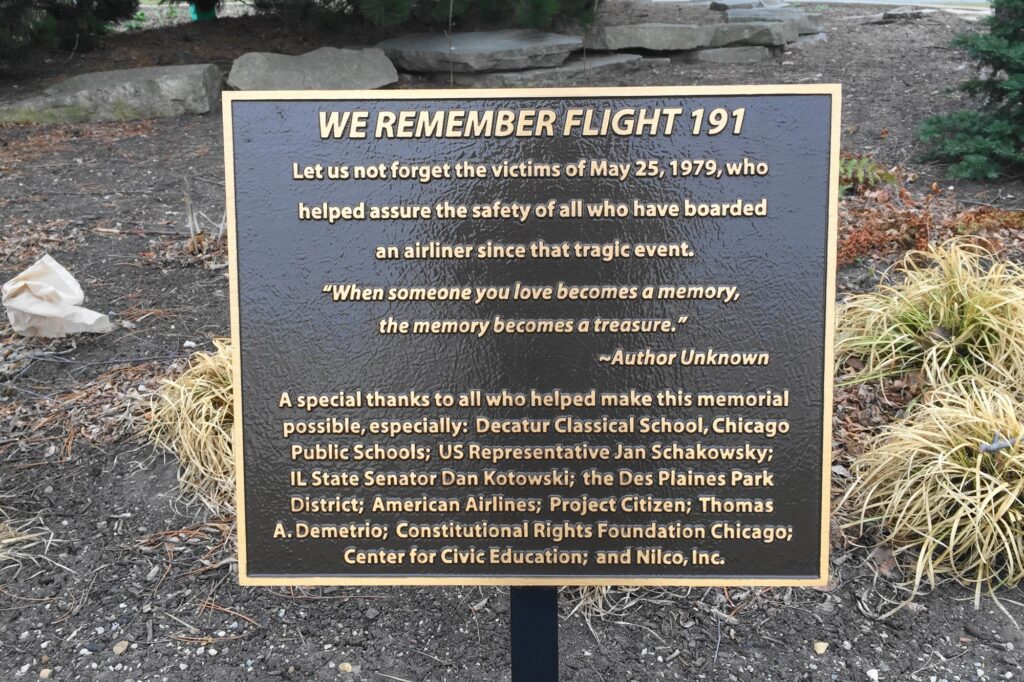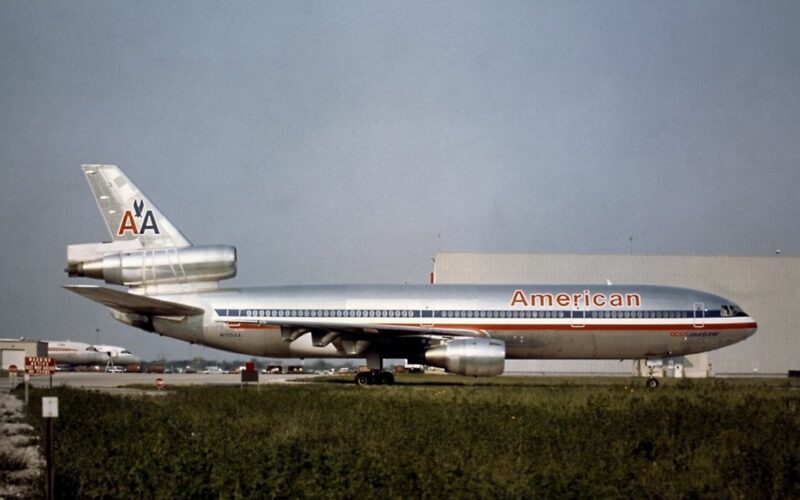May 25, 2024, will mark 45 years to the day that America watched in horror as 273 people perished in the country’s deadliest ever plane crash.
That such a bleak record has stood for so long is some testament to United States’ strong safety record, but with so many deaths under such tragic circumstances, the incident in 1979 remains a genuinely shocking catastrophe.
Sara Collins, David Coughlin, Mario Crucioli, Carol Ferntheil and Laura Marquet were just a handful of the people among the hundreds named as dead in the Washington Post two days after the disaster.
On May 25, 2024, family members and friends of those that were killed in the American Airlines Flight 191 crash will gather at the Memorial Wall and Garden in Des Plaines, a suburb of Chicago.
The Memorial Wall was dedicated to the victims of the disaster back in 2011 and it has since become a focus point for remembering those who died.
At 15:01, those attending will turn west towards Chicago O’Hare Airport (ORD) Runway 32R and observe 31 seconds of silence, the exact amount of time for which the plane was airborne.
What happened on that fateful day?
On May 25, 1979, an American Airlines McDonnell Douglas DC-10-10 was due to depart Chicago O’Hare Airport for Los Angeles International Airport (LAX) in California.
However, the flight ended in disaster 31 seconds after the triple engine DC-10 took off with 258 passengers and 13 crew members on board.
The day of the incident was a Friday, the start of Memorial Day weekend, a time when thousands of Americans travel to spend time with friends and loved ones.
American Airlines Flight 191 was set to depart at around 15:00, piloted by Captain Walter H. Lux, who had been flying the DC-10 since its introduction on August 5, 1971.
Lux was a vastly experienced pilot who was qualified to fly 17 other aircraft types, including the DC-6, DC-7, and Boeing 727.
At his side was 49-year-old First Officer James Dillard. Flight Engineer Alfred Udovich was also in the cockpit that day.

The National Transportation Safety Board (NTSB) later described the weather as “clear”, with visibility of 15 miles, in the Aircraft Accident Report published on December 21, 1979.
At 14:59 the American Airlines DC-10, registered N110AA, left the gate and began to taxi to Runway 32R.
Maintenance staff who saw the aircraft’s engine start and push back would later tell NTSB investigators that they “did not observe anything out of the ordinary”.
At 15:02, air traffic control (ATC) cleared Flight 191 for takeoff and Captain Lux was recorded saying, “American one ninety-one underway”.
According to the NTSB report the takeoff roll was “normal”, but as the aircraft accelerated down the runway, moments before the point of rotation, the left engine and strut assembly suddenly separated from the wing.
A witness described seeing “white smoke or vapor” coming from the “vicinity of the No 1 engine pylon”, and the left engine and pylon going “over the top of the wing” before falling onto the runway.
Around 6,000 feet down the runway, the American Airlines DC-10 began takeoff and reached an altitude of around 300 feet with the aircraft wings still level.
“Shortly thereafter, the aircraft began to turn and roll to the left, the nose pitched down, and the aircraft began to descend. As it descended, it continued to roll left until the wings were past the vertical position,” investigators wrote in the NTSB report.
Then, tragedy struck.
With 273 people onboard, the aircraft crashed into a field and trailer park around 4,600 feet northwest of the runway which the plane had departed only 31 seconds earlier.
The plane was destroyed in an explosion and a subsequent ground fire, and tragically two people on the ground were also killed.
Following the crash, the Associated Press reported the police chief of Des Plaines, Lee Alfano, confirming to reporters that no one on board the aircraft had survived the crash.
Rescue workers were described as searching through the “smoking rubble”, marking dead bodies with different color streamers to signal how many there were in that particular area.
In the year that was 1979 American Airlines Flight 191 crashed less than 1 mile from the end of the runway on the 25th of May at O'Hare International Airport in Chicago do to the separation of it's left engine Killing 258 passengers and 13 crew members RIP 🕊️ pic.twitter.com/J3ZxRRfUCq
— Raylene – Undercover Indie ® (@UndercoverIndy) June 5, 2023
A witness who saw the crash told the Associated Press that he “could not believe what he was seeing”, while the manager of the trailer park said the aircraft “belied over and went straight down”.
“One of my superintendents just came back from the field and he said, ‘there’s bodies scattered all over’,” another witness told the news outlet.
What caused the crash?
Just under seven months after the American Airlines Flight 191 tragedy, the NTSB published its accident report into the incident.
The NTSB found that the McDonnell Douglas DC-10-10 had suffered an engine/strut failure, resulting in both units separating from the aircraft.
At the same time, around three feet of wing leading edge also broke away from the plane and fell onto the airport runway.
The NTSB established that neither of the pilots were aware that key sections of the aircraft had separated from the aircraft, presuming instead that the aircraft had experienced an engine failure.
40 years ago today, American Airlines Flight 191 crashed during takeoff at Chicago-O'Hare International Airport, killing 271 on board and two people on the ground. | Photo Fred Jewell pic.twitter.com/eKCwFvVgM6
— AP Images (@AP_Images) May 25, 2019
Compounding the issue, hydraulic lines were severed by the pylon, resulting in a loss of associated hydraulic pressure and retraction of all slats outboard of the left engine.
Without power from the left engine, several aircraft systems and instruments, including the left stall warning computer and the stickshaker (stall warning), became non-functioning.
The NTSB ascertained that, while still on the runway, the aircraft had accelerated through the engine-out climb speed, V2, which is normally achieved at around 35 feet above the ground, before taking off at V2 + 6 knots.
The report concluded that the plane was being flown in accordance with American Airline’s engine failure procedures.
Around nine seconds after takeoff, the plane had accelerated to 172 knots and reached 140 feet of altitude, but 11 seconds later, at an altitude of 325 feet, the plane’s airspeed had been reduced to 159 knots.
The NTSB established that the DC-10 had decelerated from 172 knots toward V2, to follow the engine-out climb procedure, when the left wing stalled at 159 knots.
The stall resulted in the aircraft initiating a left roll and the loss of control, which led to the tragic crash.
The report found that, through the loss of hydraulic pressure, several left-wing leading-edge slats retracted, which affected the wing’s ability to generate lift and the crew’s capability to control the plane.
But why did the engine and pylon separate from the aircraft?
The NTSB investigation established that the plane’s dreadful fate might have been sealed around two months prior to the disaster.
The NTSB determined that the strut failure was caused by unintended structural damage during an earlier engine change at the American Airlines aircraft maintenance facility in Tulsa, Oklahoma.
In memory of the 273 people lost in the crash of American Airlines Flight 191, pause for 31 seconds today at 3:04 pm. That marks the amount of time 44 years ago that the aircraft was in the air. The AA191 Memorial is on the NW corner of Lee & Touhy, not far from the crash site. pic.twitter.com/b4ERQojfcD
— Kris Habermehl (@KrisHabermehl) May 25, 2023
Between March 29 and 30, 1979, the engine and pylon had been removed from the wing for maintenance.
Though manufacturers McDonnell-Douglas advised that the engine and pylon be removed one by one, American Airlines had developed a procedure using a forklift to remove, support and replace the engine and pylon as a unit.
The technique lacked the precision necessary for the task, and a shift change halfway through the work may have created a misalignment between the engine/pylon and the wing.
During reinstallation, rotation of the engine/pylon assembly around the forward fitting resulted in rear mount contact with the wing clevis.
Though no damage was visible at the time, this contact would have caused the pylon aft bulkhead to begin cracking, which became worse once the aircraft returned to service.
Under continuous strain, the engine and pylon eventually separated from the aircraft weeks later, with catastrophic results. on May 25, 1979.


1 comment
I was 16 years old when this happened. We lived about 5 miles from O’Hare and I just got home from school. When reported, I went outside and you could see the massive smoke cloud from my house. It was a very sad day for the entire city. I will never forget this horrible event. May they all rest in peace, and God bless the crew for trying their best to try to save the plane and passengers.